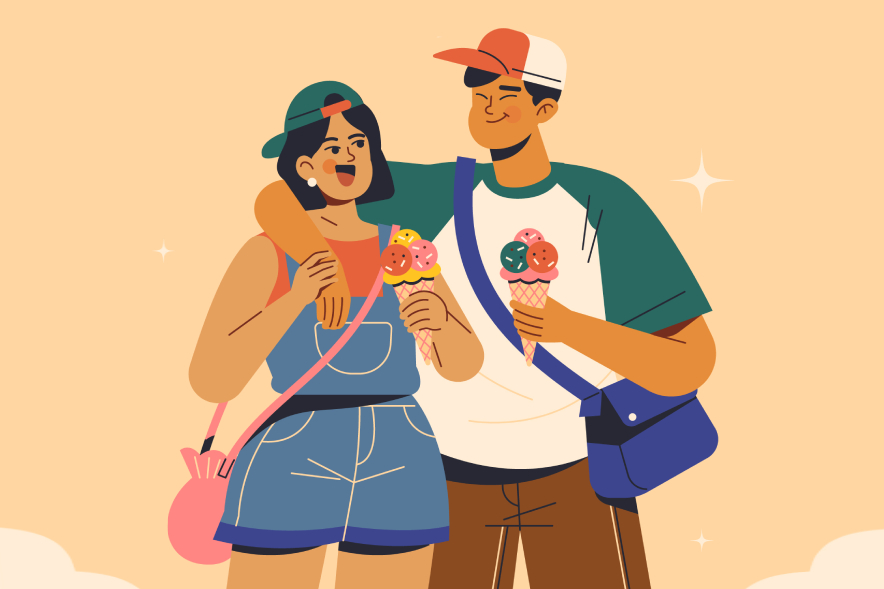You laugh a little harder at their jokes. You think about them way more than you probably should. And you start noticing the way their hair curls behind their ear or how they always remember to bring you snacks when you're sad. You tell yourself it's just friendship... until your stomach does that weird somersault thing when they touch your arm. Classic.
This isn’t some sappy rom-com setup—this is real life, and it’s messy. But also kind of thrilling.
Wait, is this normal?
Totally. According to a small 2023 survey we ran with 246 college students and young professionals between 20 and 35, over 62% said they’ve had romantic feelings for a close friend at some point. And 28% said those feelings lasted more than a year.
That doesn’t make you weird—it just makes you human.
Clinical psychologist Dr. Rachel Stein says, “Friendship is a great foundation for love because it already includes emotional closeness, trust, and shared values. So when those lines start to blur, it’s not surprising.” Makes sense, right? You’re already emotionally invested. It’s not like your brain’s going to say, “Okay, we like them platonically. Let’s just stop there.”
But how do you know it’s not just… closeness?
That’s the hard part. Being close to someone doesn’t automatically mean you're in love. Friends can be intimate without it being romantic. But there are signs that things might be tipping into something else.
Here’s a quick gut check:
- Do you get a little jealous when they talk about dating someone else?
- Do you imagine what it’d be like to kiss them—and not in a jokey “haha imagine if we made out” kind of way?
- Do you find excuses to spend time alone with them, even when you’re both exhausted?
- When something big happens, are they the first person you want to tell—not just because they're your friend, but because their opinion really matters?
If you answered “yes” to most of those, well... yeah. It might be more than just friendship.
A personal mess (because let’s be honest, this stuff isn’t clean)
One guy in our survey said, “I thought I was just being a good friend, always wanting to make her laugh and help her with stuff. Then one day she told me she liked someone else and I was crushed. That’s when I realized—oh. I’m in trouble.”
It happens all the time. You build a safe space with someone, and somewhere along the way, feelings get tangled up like old Christmas lights. You don’t even realize how tight the knot is until it’s too late to yank free without snapping something.
But what if you’re wrong?
This is the part people really freak out about. The fear of losing the friendship is real—and valid. No one wants to be the person who says, “Hey, I think I might like you as more than a friend,” only to hear, “Oh... I love you like a friend.”
Oof.
But here’s the kicker: according to research from the University of Wisconsin–Eau Claire, nearly 68% of romantic relationships that began as friendships reported higher satisfaction and longer duration. So while it feels risky, it might actually be one of the safer bets in the love game.
Dr. Maya Lin, a relationship therapist based in Seattle, says, “There’s this idea that confessing feelings is the end of the world if it’s not mutual. But in reality, friendships can survive romantic bumps if there’s enough maturity and respect on both sides. It’s not always black or white.”
Still, that doesn’t mean you should blurt it out during brunch while they’re chewing avocado toast. Timing and tone matter.
So… what now?
Here’s the thing—there’s no universal answer. But here are a few ways to sort through it without imploding your brain:
- Sit with it. Not everything needs immediate action. Sometimes feelings fade. Sometimes they grow. Give it a minute.
- Talk to someone else. A therapist, a mutual friend (who’s neutral), or even journaling can help. Yes, I said journaling. No, it’s not just for moody 13-year-olds.
- Look at how they act. Do they flirt back? Do they make an effort to be close in the same way you do? Sometimes the signs are there—if you’re willing to see them.
- Weigh what you’re willing to lose. This sucks, but it’s real. If they don’t feel the same way, it could change things. Are you okay with that?
- If you tell them, do it gently. Not as a big dramatic confession. Just honesty. A “Hey, I’ve been feeling something more lately, and I don’t want to mess things up—but I needed to say it” kind of thing.
One more thing
Sometimes, we fall in love with the idea of someone because they’re safe. They know us, they get our jokes, they don’t judge us when we cry over weird stuff. But that’s not always romantic love. And sometimes it is. The trick is figuring out which is which.Whatever happens—whether they like you back or don’t, whether it’s a phase or the real deal—you’re not alone. A lot of people have been there. Some ended up in happy relationships. Some didn’t. But most said they were glad they at least figured it out.
So maybe the question isn’t “Am I in love with my best friend?”
Maybe the question is, “What kind of love is this?”
And that’s worth figuring out. Even if it means sitting in your room a little longer with that ping-pong ball of a thought.
